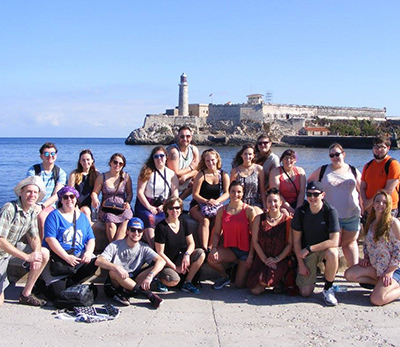Honors and Geography Students Explore Cuba

“Experience, travel – these are as education in themselves,” claimed Euripides, way back around 400 BC. And his sentiment is certainly reflected today in the experiences that such Keene State professors as Jo Beth Mullens and Christopher Cusack create for their students. Last semester, they took a group of 17 Honors and Geography students to Cuba for nine days, as the culmination of a semester-long geography class. “Geographers have long valued field-course experience as one of the most influential in not only academic learning, but also for personal growth,” said Dr. Mullens, who, with Education Professor Pru Cuper, wrote Fostering Global Citizenship Through Faculty-Led International Programs.
The mix of Geography and Honors students on the trip was an effective one. “The geographers had a strong understanding of the geography, and the physical and cultural elements, and the honors students had the incredible work ethic and the desire to excel,” Dr. Mullens noted. “This was one of the best groups I’ve ever taken abroad for their willingness to step out there and embrace the unknown.”
Dr. Mullens’ foremost intention for the class was that the students learn that they can move beyond the familiar and embrace the kind of learning experience that foreign travel offers. “I wanted them to go beyond the tourism perspective when they’re traveling and learn about a country and its people, as something they want to continue and engage in lifelong,” she explained.
In preparation, along with in-class learning about Cuba, the students conducted interviews with family and friends in different age groups, to capture their perceptions about Cuba. After the students returned home, they reviewed their interviews to see how the perceptions of Americans who’d never been to Cuba jibed with the students’ experience in the country. “We found that the younger generation does not have the negative impressions from such historical events as the Cuban Missile Crisis, or the Bay of Pigs Invasion, or the Mariel Boat Lift, or any of the significant events the have shaped the opinions of those of us who are older,” Dr. Mullens said. “The students are more open to collaborating with Cuba.”
While they were there, the students were also expected to keep a journal and reflect on what they were seeing in light of how that related to some of the perceptions they’d heard before the trip.
“I felt that it was so important to go on this trip because, not only did I learn so much about a new country, but I also learned and grew as a person,” noted Ashley Hoffer, a rising junior and dual early childhood education and dance major, with a specialization in dance education. “I honestly knew very little about Cuba, and with the United States’ history with the country, I was surprised how many stereotypes and misconceptions we have about this place. It was so enlightening to read about and research a country, and then have the opportunity to actually go and see it for myself.”
And Dr. Mullens certainly seems to have achieved her goal of expanding her students’ horizons. “For me, Cuba was a tremendous opportunity that pushed me out of my comfort zone,” Sarah Shufelt, a film major and rising senior, reported. “I’ve never traveled outside of the country, and I don’t speak any Spanish, so being dropped in the middle of a foreign country was a terrifying concept for me to wrap my head around. I was worried about the language barrier, I was worried about finding my way around, and I was worried about all the cultural differences I would encounter. But when you travel abroad, you’re forced to throw all your inhibitions out the window – you’re going to stumble through conversations. You’re going to get a bit lost. You’re going to have to speak to new people. It’s all part of this experience, and when you’re an American abroad, you don’t really have any other choice. During this trip, I was encouraged to do things I would never have done back in America, and I’m very grateful for that chance.”





